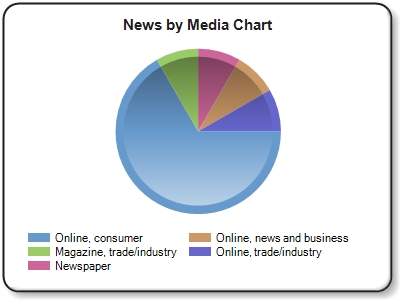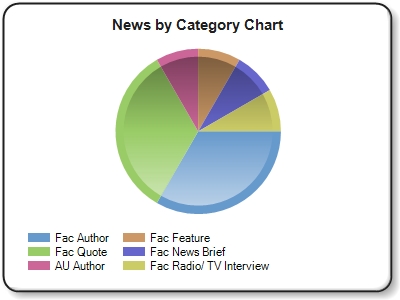Top Story
| Trump Administration Blames Obama for Syrian Chemical Attack |
| Hrach Gregoriam, director of the International Peace and Conflict Resolution Program, spoke with WUSA9 about Syria and the chemical weapons attack. Gregorian said, “This has been a problem dating back quite some time now.” Chris Edelson, director, Politics, Policy and Law Scholars program, wrote an op-ed for USA Today about the legality of the U.S. response to the chemical weapons attack. (4/4, 4/7) |
Additional Features
| 2017's Best & Worst States for Millennials |
| Kogod School of Business Executive-in-Residence Dawn Leijon spoke to WalletHub for a Q-and-A about millennials' attraction to certain cities. Leijon said, “They want jobs, high salaries, an affordable place to live, safe neighborhoods and a commute that won't kill them.” (4/4) |
| Exhibition Features the Latest Work of One of Cuba's Leading Contemporary Artists, Carlos Luna |
| American University Museum at the Katzen Arts Center Director Jack Rasmussen wrote a piece for Art Daily about Carlos Luna, a Cuban artist whose work is currently on display. Rasmussen described one of Luna's works, Black Bite, as “a technical achievement, an artistic triumph, and a cultural revelation. Luna brings viewers into the darkness and returns them to the light, both physically and psychologically.” (4/7) |
Faculty Authors
| Trump Wants an Immigration System Overhaul. Do Americans Agree? |
| Matthew Wright, professor of public affairs, co-authored an article for The Washington Post on President Donald Trump's push to change the immigration system in United States. Wright wrote, “Americans do not need to be tricked or manipulated into revealing their ambivalence about immigration.” (4/3) |
| The Arkansas Eight |
| Public Communications Professor Richard Stack authored an article for The Huffington Post about how Arkansas will execute eight death-row inmates within only a few days. Stack wrote, “This unprecedented spree triggers questions of how rapid-fire executions affect those present.” (4/4) |
| Confronting the Myths of the 'Napalm Girl' |
| W. Joseph Campbell, professor in the School of Communication, authored an article for The Baltimore Sun about the photograph “Napalm Girl” and its emotional impact. He wrote, “The photograph shows the effects of a U.S. bombing mission, that it was so evocative it swung public opinion against the war, and that it had the extraordinary effect of hastening the conflict's end.” (3/31) |
| Republicans Need to Do the Math on Tax Reform Prospects |
| Donald Williamson, executive director of the Kogod Tax Center, wrote an article for The Hill about Republicans and their approach to tax reform. Williamson wrote, “If Republicans choose a “go it alone” strategy for tax reform, they will need to rely on the same set of budget rules that helped to reveal the partisan factions among Republicans during the healthcare reform debacle only weeks ago.” (4/5) |
Expertise
| For Google's Data Wars, It All Comes Down to Location |
| Associate Professor of Law Jennifer Daskal spoke to the Wall Street Journal about how Google refuses to turn over emails and other sensitive information regarding criminal suspects to the U.S. Justice Department. Daskal said, “I see this issue percolating up to the Supreme Court.” (4/3) |
| Will Bill O'Reilly Survive Advertiser Defections? |
| Journalism Professor Jane Hall spoke to the Associated Press about advertisers pulling ads from The O'Reilly Factor after sexual harassment allegations surfaced. Hall said, “This is a surprisingly quick and strong exodus of advertisers.” (4/5) |
| 'Nuclear Option' Could Blow Up Senate Far Beyond the Gorsuch Vote |
| Jennifer Lawless, director of the Women and Politics Institute, spoke to USA Today about the “nuclear option” pursued by the U.S. Senate. Lawless said, “It's a sad day. The Senate was supposed to be better than this.” For The Conversation, Jon Gould, professor of public affairs, wrote about the nuclear option. (4/5, 4/3) |
| A Different Kind of War in America's 'Backyard' |
| Associate Professor Adrienne Pine spoke to Al Jazeera about free trade agreements between the United States and other countries. Pine said, “They have been disastrous for citizens of all the countries involved (including the United States), yet hugely beneficial for corporations.” (4/6) |
Bonus Clip
| When Whimsical Wildlife Photography Isn't What It Seems |
| Center for Environmental Filmmaking Director Christopher Palmer spoke with PBS about ethical wildlife photography. Palmer believes posing animals for photography is unethical because it normalizes manipulation of animals. (3/30) |
|


